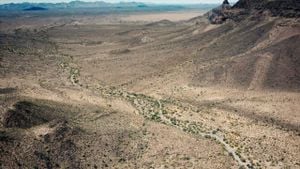Climate change is undoubtedly one of the most pressing issues we face today, with its repercussions felt across the globe. Emerging strategies for adaptation and mitigation are being discussed and developed, marking significant steps forward. This article reflects on some of the latest insights and initiatives from experts and organizations dedicated to addressing the dual challenges of climate change and land degradation.
The urgency of the climate conversation has sharpened as scientists and policymakers converge for events like the UN Conference of Parties. Climate experts are making significant recommendations on the necessity for transformational adaptation strategies, particularly as land degradation worsens under climate stresses.
For many regions, the signs of land degradation are painfully apparent. A recent panel discussion highlighted the perilous state of drylands worldwide, with up to 90% facing degradation risks, particularly troubling for areas like Southern Europe, the United States, and parts of Asia. According to Hassan Yasin from Somalia Greenpeace Association (SOGPA), nearly 80% of Somalia’s land is degraded, triggering issues like displacement and poverty. The effects of climate change are intensifying these struggles, with increasing frequency and severity of extreme weather events such as floods and droughts.
The World Bank has drawn attention to these crises, illustrating how environmental degradation often leads to heightened social conflicts. The intersection of climate and conflict was also called out by Aaron Kaplan from Tufts University, who cautioned against simplistic narratives framing climate change solely as the root cause of conflicts. Instead, he emphasized the importance of recognizing social and economic inequities as primary drivers of unrest.
During this dialogue, there was consensus among speakers about the inadequacies of small-scale adaptation efforts. They argued for broader, systemic changes—what they termed transformational adaptation. This approach isn’t just about tweaking existing methods but rather revamping how communities engage with climate and land management. Ahmed Yasin reinforced this idea, noting,"Adaptation must be rooted in the lived experiences of those affected." This highlights the necessity of community involvement and local knowledge as integral to crafting solutions.
Bridging the gap between research and action has emerged as another priority. Yasin pointed out significant barriers, including technical capacity deficits and financial shortcomings, preventing local communities from putting sustainable practices to use. The call was made for improved financial mechanisms and government accountability. Tools like simulation exercises and scenario planning were suggested to help spur political engagement and preparedness for the inevitable climate-related crises.
This conversation builds toward the upcoming 16th Conference of the Parties to the UN Convention to Combat Desertification (UNCCD) scheduled for Riyadh, Saudi Arabia. Experts were clear: the time to act is now, and collaboration among stakeholders will be key to addressing these intertwined crises effectively.
Across the world, urban areas are also grappling with the dual threats of climate change and rapid urbanization. One city at the forefront is Vitoria-Gasteiz, located in the Basque Country, Spain, which has been embracing nature-based solutions to bolster urban resilience. The city’s forward-thinking strategies have earned it accolades such as European Green Capital.
Maider Etxebarria, the city’s mayor, recently described how Vitoria-Gasteiz’s approach prioritizes investing heavily in biodiversity and sustainability. The city has launched its Green Urban Infrastructure Strategy, aiming to revitalize urban biodiversity and entail planning against the backdrop of climate-induced challenges like flooding and drought. Such strategies aim to integrate nature within urban spaces—significantly enhancing the functionality and aesthetic appeal of these areas.
These municipal efforts don’t happen in isolation; they are guided by European policies and strategies like the EU Adaptation Strategy and the EU Biodiversity Strategy. The combination of local insights and broader regulatory frameworks is positioned as central to the successful implementation of sustainable, climate-responsive practices.
Turning toward technology, innovations such as AI-driven tree modeling are changing the face of urban forestry and climate adaptation. Researchers at MIT, Google, and Purdue University have developed Tree-D Fusion, which creates 3D models of urban trees based on AI, allowing for detailed foresight on tree growth under various climate scenarios.
The potential applications for such technology are vast. Urban planners can utilize it to anticipate tree growth and its impact on surrounding infrastructure, or identify areas needing increased vegetation to maximize cooling effects. More significantly, it addresses equity by mapping urban tree canopies and highlighting disparities across communities, promoting fair access to green services.
This technology extends beyond immediate urban benefits, forming part of larger efforts to combat climate change at the community level. It emphasizes the necessity for integrated planning processes across urban landscapes focused on resilience and sustainability.
Efforts like these—fueled by research, community involvement, and technological innovation—signal the evolution of climate change strategies toward more inclusive, actionable frameworks. Cultivated initiatives across the globe highlight the importance of partnerships and local insights, as cities increasingly acknowledge their role as front-line responders to climate challenges.
Yet, as localized action ramps up, the conversation can’t stray too far from the fundamentals. Continued advocacy for governmental accountability and systemic reform remains imperative. Experts at recent discussions have pushed for more than just acknowledgment of climate change; they urge for the means and structures to facilitate policy implementation, resource allocation, and community empowerment.
Although times seem precarious, the growing emphasis on integrated and inclusive climate strategies fosters hope for transformative progress. The collective focus on community-driven approaches and nature-based solutions demonstrates how ecosystems can be allies rather than merely obstacles, even as challenges mount. The path forward lies not just within policy or technology alone, but through grassroots movements fostering collaboration to reclaim the narrative of place, empowerment, and resilience.
Significant strides are being made across the globe, but the next few years will prove pivotal. Whether through targeted policy shifts, technological advances, or community-driven initiatives, the narrative generated now will largely determine the success of climate adaptation and mitigation strategies moving forward. The interconnectedness of environmental, social, and political landscapes is clear, and working synergistically will undoubtedly be necessary to forge sustainable futures.
Climate change adaption and mitigation remain complex and multifaceted challenges, but the collective efforts from various sectors—governments, communities, researchers—emphasize the possibility of positive change. The urgency for action is perhaps the single greatest lesson and motivation: the time for dialogue is swiftly transitioning to the time for implementation.
Still, achieving meaningful progress will require acknowledging the limits of past efforts and striving for innovative practices unafraid of transformation. The growing consensus urging for more comprehensive adaptation strategies reflects not only the reality of our current challenges but the determination to rise above them. With collaboration as our cornerstone, the potential for enduring resilience can transform not just landscapes, but lives.



